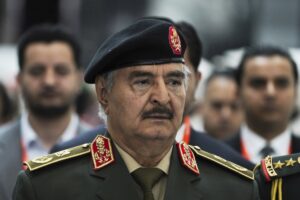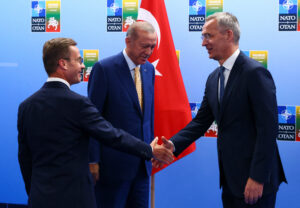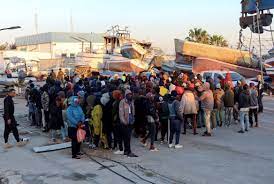
The National Interest Foundation Newsletter
Issue 198, July 14, 2023
Welcome to our NIF Newsletter. In this week’s headlines: we analyze the motivations behind Khalifa Haftar’s support of the Rapid Support Forces in Sudan, look into the recent NATO summit and its effect on the Middle East, examine the escalating migrant crisis in Tunisia and Libya, and investigate how Assad benefits from the captagon trade in Syria.
Written by Jacob Van Veldhuizen and Toni JeBailey
Haftar’s Support for the RSF

Haftar’s support for the RSF may jeopardize his relationship with Egypt. (Photo from AP)
Haftar’s Support for the Rapid Support Forces
As Sudan nears its 3rd month of war, it is becoming ever more evident of the extent of external powers involved in the conflict. One of these powers is Libyan warlord Khalifa Haftar. According to multiple reports and satellite images, Haftar has been providing aid to the Rapid Support Forces (RSF) led by Mohamed Hamdan Dagalo (aka Hemedti). Haftar’s forces, known as the LAAF The Russian-backed Wagner Group is also involved, working with Haftar to transport supplies and guard bases where the supplies are housed. Most of the supplies being shipped by Haftar are fuel, which the RSF is in dire need of. Currently, the Sudanese Armed Forces, led by Abdel Fattah al-Burhan, control most of the oil fields in the country. If the RSF hopes to continue fighting, fuel is essential. Other supplies of note include anti-tank missiles, surface-to-air missiles, and medical supplies.
Haftar’s support for the RSF in this current conflict predates the outbreak of violence. U.S. intelligence indicates that RSF troops were seen being trained by Haftar’s forces in urban combat months before the start of the war. This training has no doubt proved invaluable, with large urban areas like Khartoum seeing the most fighting.
The RSF and LAAF are long times allies that have conducted military operations together. In 2019 during the Libyan Civil War, a thousand RSF troops were deployed to Libya to help in Haftar’s attempt to capture Tripoli. It is unlikely that Haftar will deploy his troops to directly support the RSF, as this would jeopardize his relationship with Egypt, which is backing Burhan with troops of their own. Haftar is currently walking a political tightrope. His support of the RSF puts his relationship with Egypt, who are backing Burhan. Losing Egyptian support would be a damaging blow to Haftar’s forces.
Russia and the United Arab Emirates are also involved in these transactions. Haftar has a close relationship with both Russia and the UAE. Moussa Tehoussay, a member of Libya’s Change Party, has indicated that Haftar’s support is primarily related to his allies outside of Libya, referring to Russia and the UAE. Multiple sources have indicated that Russia and the UAE are responsible for providing the support that is being transported into Libya. Both Russia and the UAE have been working to extend their influence in the Middle East. This is just one of the many areas these powers are indirectly influencing.
Haftar does see some personal benefits from the arms shipments. The Haftar family is deeply involved in the illicit trade networks between Sudan and eastern Libya. Fuel, captagon, hashish, gold, stolen cars, and people have been smuggled in and out of Sudan and Libya. Continuing to uphold relations with the RSF, which controls the area where much of the smuggling happens, allows the smuggling to continue.
Libyan support will likely continue for the RSF, but not in large enough quantities to have any significant impact. The is also little chance that Haftar will send troops to aid in fighting to not risk his relationship with Egypt. The fallout from a potential incident between Egyptian troops operating in the area and Libyan forces far outweighs any benefits of supporting the RSF. Relegating his support to supplies will give him enough flexibility to easily stop the flow of aid if it becomes an issue. However, Russia and the UAE have significant power over Haftar’s actions. This may force Haftar to make decisions that could potentially harm his relationship with Egypt.
Russia’s and the UAE’s involvement in Libya and Sudan is part of the increasing trend of larger powers exploiting unrest within smaller powers for their own countries’ gain. This exploitation prolongs conflict leading to more death, destruction, and suffering for civilians. Russia and the UAE are not the only countries doing this. This behavior will likely continue to escalate as U.S. influence continues to deteriorate in the region.
NATO Summit

Turkey has agreed to allow Sweden to join NATO. (Photo from Reuters)
What the NATO Summit Means for the Middle East
With the conclusion of the NATO 2023 Summit in Vilnius, Lithuania, this past Wednesday, the implications of this event on global diplomacy and policy will determine the future of both those within the alliance and beyond. The central focus of this week’s conference included primary decisions regarding Ukraine, with new pledges made for Ukraine’s membership into the block and increased military support from other member states. Yet, another major shift in political alliance occurred before the official start of the conference on Tuesday that forced the coalition to look further east. As discussions of military alignment and support conclude in Vilnius, NATO must remember the importance of the Middle East and its influence on decisions, policies, and incidents.
This week, an area of focus was Turkey and recently re-elected President Erodgan, who played a significant role in NATO decisions during the summit. Following Russia’s invasion of Ukraine early last year, the global shifts in action due to the crisis were set into motion, with Turkey geographically and politically in the middle. While Turkey has blocked access to the Black Sea for Russian forces and helped broker various diplomatic deals, the continued trading and meetings with Russian President Putin have left the state in an ambiguous position within the conflict and the greater global community. Sweden and Finland, two states previously abstaining from military interference, applied to join NATO to support Ukraine. With the consensus among all NATO members required to approve membership, Turkey initially prohibited both states from entering into the contention that they harbored perceived terrorists by the Turkish state. Turkey eventually gave its support to Finland this past April, yet continued to block Sweden’s memberships with claims of deeper causes for concern, including the aid and abetting of the Kurdistan Workers Party and the burning of the Quran outside a Stockholm Mosque in Sweden. Sweden has adapted consistently in attempts to appease Turkey, including amendments to strengthen anti-terrorist laws, dropping embargos, and extraditing requested individuals by Turkey. On Monday night, President Erodgan reversed his stance and gave Turkey’s support to Sweden’s membership of NATO, with meetings the following day showing a new sense of strength as a united alliance.
However, Erdogan’s political move was not made without ulterior motives present, as accepting Sweden’s membership into NATO supported Turkey’s efforts to join the European Union. Turkey’s approval followed Sweden’s support of an EU customs agreement to incorporate Turkey into the union’s passport-free travel allowances. While an EU representative has regarded both states’ membership endeavors to NATO and the EU as “separate processes,” an aspect of transactional agreements is evident in Turkey and Sweden’s recent actions pertaining to their larger goals. With Turkey reaffirming their aspirations for EU membership, the temporary leverage provided during the NATO summit is part of a long-term plan for their bid for approval and eventual EU integration. With Erdogan’s upcoming meetings with Gulf state officials showing indications of more significant global partnership and investment, Turkey is creating the political stage to perform upon later.
Moving past this weekend’s conference, it is evident that while international priorities may sometimes lie outside of the Middle East, a new era of regional power players has entered the political landscape. Turkey’s decisions this past week may have an unknown impact on their bid for EU membership, yet add to a trend of political realignment and diplomatic presence previously unseen by the state. With the Middle East consistently being the topic of military security and investment, a new period in global diplomacy is being introduced. Middle Eastern states are rising in prominence to secure regional and international stability in terms of NATO and beyond. As rapprochement efforts continue within the upcoming weeks, it will be imperative to see how these Middle Eastern powers continue to shift international diplomacy and relations.
Tunisian-Libyan Refugee Crisis

Racial tensions have forced many migrants to use more dangerous routes to migrate to Europe. (Photo from Reuters)
Tunisian-Libyan Refugee Crisis Continues Deadly Escalation
After over a week of detainment in the Tunisia-Libya border region, about 500 migrants have been returned to Tunisia. The refugees were initially rounded up by armed men in Sfax, a prominent migration port city, in the middle of the night earlier this month. Once transported to the detainment area between the Tunisian-Libyan land border near Ben Guerdane and the Mediterranean Sea, migrants were forced to endure inhumane conditions, including denial of food or fresh water. Many migrants detained were originally from various African countries, including Cameroon, Chad, Guinea, Ivory Coast, Mali, Senegal, and Sudan, hoping to voyage to Italy on dangerous, ill-equipped boats. Yet, while the migrants have been returned from the Ben Guerdane zone, deeper underlying issues facing migrants in both Tunisia and Libya remain.
Back in Sfax, racial tensions remain heightened after escalations between African migrants and Tunisian residents resulted in the death of one Tunisian man. With fears of potential retaliation, this event sparked one of the recent overnight detainments of migrants and relocation to the desolate Tunisian-Libyan border area. The current conditions within Sfax are compounded by food insecurity, state conflict, and economic peril, leaving Sub-Saharan migrants often as the scapegoat for the frustrations resulting from these conditions. Tunisian President Kais Saied’s speech strengthened these xenophobic sentiments earlier this year, citing migrants as sources of “all the violence, crime, and unacceptable practices.” This combination of rhetoric and instability has created the perfect conditions for discrimination and racial targeting within Sfax. Following the detainment and later return of the 500 migrants to Ben Guerdane, the Tunisian government denied accusations of bias and mistreatment from various global human rights groups such as the Human Rights Watch, with President Said stating that migrants had not only been adequately treated but also were protected in alignment with “the values” of the state.
Yet, despite these claims of discrimination, migration trends to Europe via Tunisia have only increased this past year as migrants remain desperate in their attempts at resettlement. Intending to create a better life for themselves and their families, many migrants embark on incredibly unsafe journeys across the Mediterranean Sea via ill-equipped boats. With a ship bound for Italy from Tunisia sinking this past weekend, leaving one dead and ten missing, the migrant death toll this year due to sea-related deaths has risen to over 600 individuals, a staunch increase from previous years.
As conditions for migrants within Tunisia remain dire in all capacities, attention has shifted to the international community for an adequate response. With an anticipated $1.1 billion in aid expected to be disbursed within the state from European countries in hopes of deterring migration, the situation within Tunisia remains hostile as upticks in migrant expulsion continue. Yet, as Italy recently lifted its 10-year travel ban on Libya, European nations continue demonstrating a vested interest in Tunisia and Libya. To what extent these endeavors will help contribute to de-escalation within both Tunisia and Libya and the long-term and sustainable approaches to refugee management remains unknown. Despite this uncertainty, one thing remains, the simultaneous persecution and perseverance of the migrant within Tunisia. As perilous conditions are faced from all perspectives, those seeking migration to Europe continue to undertake these all for the opportunity of a better life abroad. With the situation at the Tunisian-Libyan border remaining tense, only time will determine if European relief will aid the issues at hand.
Syria’s Captagon Industry

Gulf states have demanded Syria do more to stop the Captagon trade. (Photo from AP)
Syrian Conflict Fueled by Unlikely Industry
The Syrian Information Ministry recently revoked the BBC’s media accreditation of two journalists, citing that the articles published were “false and misleading.” The Syrian government has repeatedly warned BBC regarding their depiction of the state since the conflict began in 2011, citing a continued trend of misrepresentation by the media empire. Yet, what cemented the final severance was a story reporting on the rise of Captagon, a synthetic amphetamine, and the drug’s alleged connection to Syrian President Bashar Assad’s family and other senior army officials concerning their role in production and distribution. With the Syrian government not explicitly citing this article in the reasoning for removing BBC’s accreditation, it calls into question the magnitude of the entire situation and market of Captagon.
The production of Captagon originated in Germany in the 1960s, as it was initially intended for attention deficit disorders, narcolepsy, and other conditions. It was discontinued in the late 1980s, but illegal production continued in Eastern Europe and eventually made its way to the Middle East. The current black-market version often contains fenethylline, caffeine, and other fillers intended to strengthen or lengthen the pill’s effects. Captagon production, specifically within Syria, can be traced back to 2014, with “the drug of jihad,” as it is nicknamed, being distributed to ISIS soldiers to keep them awake during the conflict. Its production has expanded since then, with factories established throughout the country and on the borders with Lebanon and Jordan.
With BBC documenting Jordanian and Lebanese forces attempting to crack down on Captagon smuggling, the drug’s integration into the military and state became increasingly evident. Through journalistic reporting and recording, the ties between Captagon and the Fourth Division, an elite sector of the Syrian Army, became more evident. The Fourth Division is led by Maher al-Assad, brother to Syrian President Bashar al-Assad. Its continued economic expansion over the years despite the heavy sanctions calls into question the source of revenue streams. It is the only section of the Syrian Army capable of free movement across borders without restriction, making it possible for smuggling to occur. With the EU citing the government as a “central player” in the production and trade of Captagon, a series of sanctions and condemnations have been put into place on top government officials by the United States, United Kingdom, and European Union. BBC has uncovered further connections to the trade of Capatgon within Syria to the Assad family, resulting in the recent revoking of accreditations.
As the most considerable market demand for the drug exists within Saudi Arabia, various Arab states have pledged that halting the production and trade of Captagon remain essentially in stopping the crisis within Syria. With officials from Syria, Egypt, Iraq, Saudi Arabia, and Jordan meeting this past May to discuss Syria’s rejoining the Arab League, it was deemed essential for Syria to crack downon the drug before its re-admittance. With international pledges and policies being enacted to help curb the continued industry, the true extent to which Captagon is integrated into the Syrian state remains wholly unknown, as only an active effort from all parties to stop trade networks will allow for the drug to release its stronghold.
